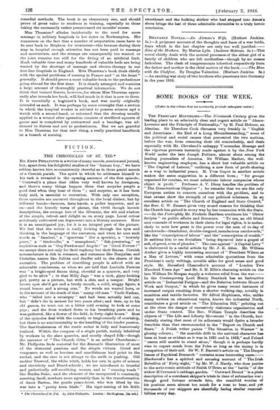SOME BOOKS OF THE WEEK.
[Notice in this column does not necessarily preclude subsequent review.] Tan FEBRUARY Monestz.nts.—The Nineteenth Century gives the leading place to an admirably clear and cogent article on " Alsace- Lorraine and the Principle of Nationality," by M. Paul Helmer, an Alsatian. Sir Theodore Cook discusses very frankly in " English and Americans : the End of a Long Misunderstanding," some of the political and social causes that prevented the two nations, before the war, from resuming their old comradeship, and deals especially with Mr. Cleveland's unhappy Vinezuelan Message and the vigorous protests instantly made against it by the .New York World under the late Joseph Pulitzer, almost alone among the leading journalists of America. Sir William Mather, the well- known engineering employer, has a short but valuable article on " The Capital of Labour," outlining a new form of profit-sharing as a way to industrial peace. M. Yves Guyot in another article makes the same -suggestion in a different form ; " for groups organised for combat, we must substitute labour companies whose object is profit." Professor A. V. Dicey handles the problem of " The Conscientious Objector " ; he remarks that we are the only European nation to concern ourselves with the problem, and to that extent show the strength of our political tolerance. In an excellent article on " The Church of England and State Control," the Rev. C. W. Emmet gives very sound reasons for thinking that the Church has gained in every way by her connexion with the State. —In the Fortnightly Mr. Frederic Harrison continues his " Obiter Scripts " on publio affairs and literature. " To me, an old friend and comrade of workmen in their claim for legal rights, it is melan- choly to note how great is the power over the men of to-day of catchwords—fraudulent, double-tongued, mendacious catchwords," like the " conscription.of labour" and the" conscription of wealth." It saddens him to see Socialism " being depraved into a gospel of self, of greed, even of plunder." The case against " A Capital Levy " is elaborated in a useful article by Mr. J. E. Allen. Mr. William Archer gives a highly interesting account of " President Wilson as a Man of Letters," with some admirable quotations from the President's early writings, notable alike for good sense and good style. Mr. Beresford Chancellor's account of " London Two Hundred Years Ago " and Mr S M. Ellis's charming article on the late William De Morgan supply a welcome relief from the war.— In the Contemporary Lord Henry Bentinek has an instructive article on " Industrial Fatigue—and the Relation between Hours of Work and Output," in which he gives many recent instances of increased output resulting from a shorter working-day, notably in munition and textile factories. Sir Alfred Hopkinson, who, unlike many writers on educational topics, knows the industrial North, contributes a good article on " The Education Bill," pointing out at the close the danger of excessively elaborate organization and undue State control. The Rev. William Temple describes the objects of " The Life and Liberty Movement " in the Church, inci- dentally stating that most of its adherents would desire a broader franchise than that recommended in the " Report on Church and State." A Polish writer paints " The Situation in Warsaw " la gloomy colours ; " the anarchic drift in the national character has been at least as evident as it was in 1831 and in 1883," and Poland " seems still unable to stand alone," though it is perhaps hardly wise to expect much from the Poles so long as the enemy is in occupation of their soil. Sir W. F. Barrett's article on " The Deeper Issues of Psychical Researoh " contains some interesting cases.:— Blackwood's has a spirited and amusing account of " The Irish Rebellion of ' Forty-eight,' " by Mr. W. J. Hardy, who does justice to the serio-comic attitude of Smith O'Brien at the " battle " of the widow M'Cormack's cabbage-garden. " Outward Bound " is a plain description of a merchant skipper's trials in time of submarine war ; though good fortune attends him, the manifold worries of his position seem almost too much for a man to bear, and yet thousands of our skippers are cheerfully facing similar respond- bilities every day.


































 Previous page
Previous page